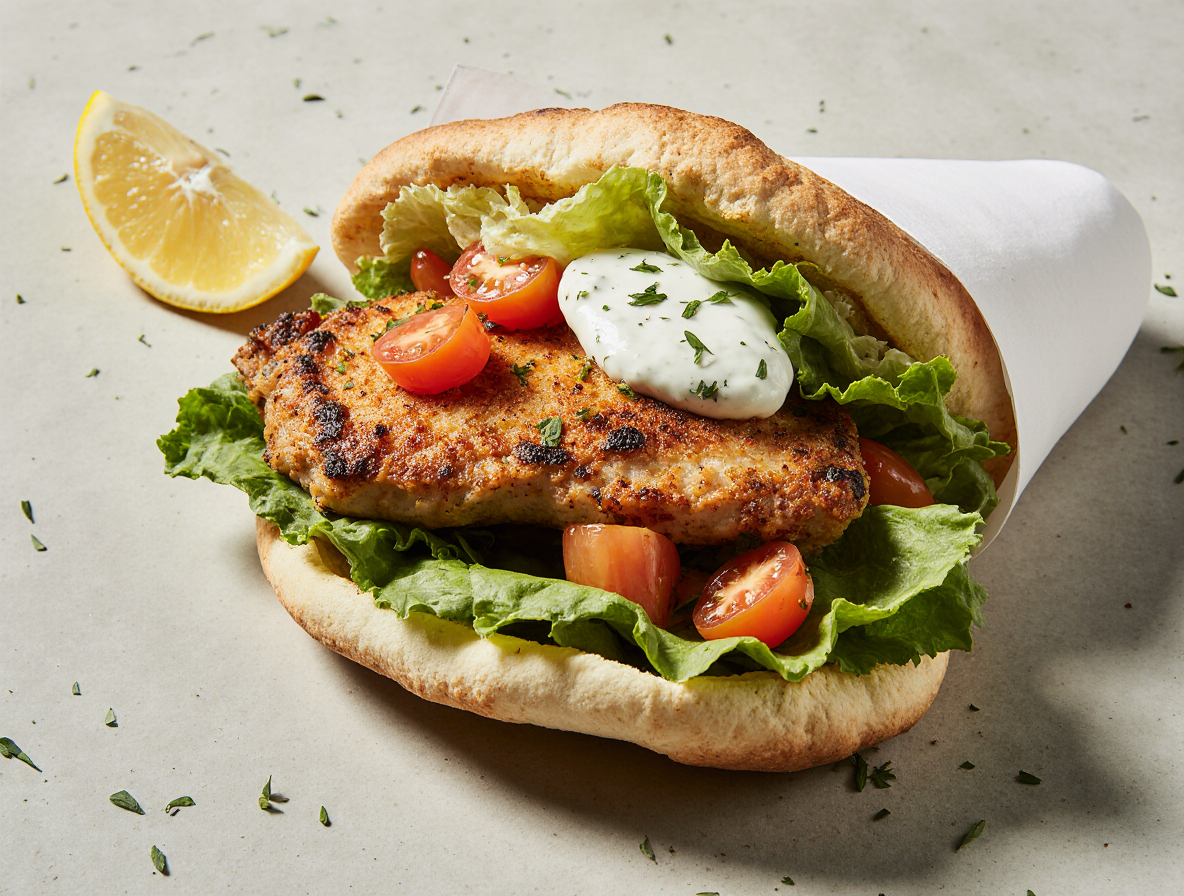How to Make Perfect Chicken Gyro Marinade: A Greek Family Secret
Did you know a perfect chicken gyro marinade transforms ordinary poultry into extraordinarily tender, flavor-packed meat?
The secret lies in yogurt—this magical ingredient not only carries flavors beautifully but also tenderizes chicken through a fascinating process. The acid in Greek chicken gyro marinade actually breaks down the meat fibers, allowing the marinade to infuse deeply into the chicken. Furthermore, traditional chicken gyro yogurt marinade needs time to work its magic—at least 2 hours, preferably 3, and ideally 12 hours. For the absolute best results, some Greek families even marinate their chicken for a full 24 hours.
The word “Gyro” itself comes from the Greek term for “turn” or “rotate,” describing how this delicious meat is traditionally cooked on a vertical spit. When prepared correctly, the chicken becomes incredibly juicy, creating a wonderful contrast with warm, blistered bread for a true crescendo of flavors. In this article, we’ll share our family’s easy chicken gyro marinade recipe that guarantees tender, perfectly seasoned chicken that pairs beautifully with tangy tzatziki sauce and fresh Greek salad.
The Secret Behind a Greek Chicken Gyro Marinade
The magic of a chicken gyro marinade lies in a perfect balance of simple yet powerful ingredients. Unlike ordinary marinades, traditional Greek versions rely on specific components working in harmony to create that distinctive flavor profile.
Why yogurt is essential for flavor and tenderness
The foundation of any authentic chicken gyro marinade begins with Greek yogurt. This isn’t just a flavor carrier—it’s a transformation agent. The lactic acid in yogurt works by breaking down the proteins in chicken, making each bite remarkably tender. This scientific process allows the marinade to penetrate deeply into the meat rather than merely coating the surface. Additionally, yogurt creates a paste-like consistency that clings beautifully to the chicken during cooking, unlike thinner marinades that run off. This adhesive quality ensures the flavors remain locked in throughout the cooking process.
The role of garlic, lemon, and oregano
Every ingredient in a Greek chicken gyro marinade serves a specific purpose:
- Garlic: No Greek chicken gyro marinade recipe is complete without generous amounts of garlic—typically 3-10 cloves depending on family preference. As one source emphatically notes, “It wouldn’t be a Greek recipe without garlic!”
- Lemon: Both the juice and zest play crucial roles. The acid from lemon juice helps break down tough chicken fibers while adding brightness. Meanwhile, the zest intensifies the citrus flavor profile without additional liquid.
- Oregano: Dried oregano, specifically Greek oregano if available, delivers that bold Mediterranean character. It’s used liberally to create the distinctive aroma that makes authentic gyros immediately recognizable.
How Greek families traditionally marinate chicken
In Greek households, patience is considered essential for developing maximum flavor. Though the yogurt starts working its magic within 15 minutes, most families marinate their chicken for at least 2 hours. Many prefer 4-5 hours or overnight for deeper flavor penetration. However, the acid in yogurt and lemon can eventually affect texture negatively, so marinating beyond 24 hours isn’t recommended.
The beauty of this family-style marinade lies in its adaptability while maintaining core elements. As long as the yogurt-garlic-lemon-oregano foundation remains intact, each family can adjust proportions to suit their particular taste preferences.
Ingredients for the Perfect Chicken Gyro Marinade
Creating an authentic chicken gyro marinade requires carefully selected ingredients that work together to produce that distinctive Greek flavor. Let’s explore each component and understand its role in crafting the perfect marinade.
Greek yogurt and its alternatives
Greek yogurt forms the foundation of any traditional chicken gyro marinade. Full-fat Greek yogurt is preferred for its rich texture and superior tenderizing properties. The lactic acid in yogurt breaks down tough chicken fibers, creating moist chicken that’s never rubbery or dry.
For those who need alternatives, several options exist:
- Buttermilk serves as an excellent substitute since it contains similar lactic acid levels. Simply replace yogurt with an equal amount of buttermilk.
- Sour cream delivers comparable tenderizing effects plus a velvety richness.
- Coconut milk offers a dairy-free option that adds a subtle tropical twist.
- Non-dairy yogurt works well for those with dietary restrictions.
Essential herbs and spices
The signature flavor of Greek chicken gyro marinade comes from a precise blend of aromatics:
Garlic is non-negotiable—use 4-5 cloves for authentic taste. Fresh garlic provides the most robust flavor, although jarred varieties work in a pinch.
Oregano (preferably Greek) should be dried rather than fresh as it delivers stronger flavor. A generous amount (about 1-2 tablespoons) creates that quintessential Greek aroma.
Other key seasonings include lemon juice and zest for brightness, olive oil (preferably extra virgin), and red wine vinegar for added tang. Many recipes incorporate paprika, cumin, and coriander for depth. A surprising addition? A pinch of cinnamon adds subtle warmth without being detectable.
Choosing the right cut of chicken
Chicken thighs are overwhelmingly preferred for gyros due to their higher fat content. They remain juicy throughout cooking and resist drying out. For best results, select boneless, skinless thighs.
Although chicken breasts can be substituted, they require more attention to avoid dryness. If using breasts, consider butterflying or pounding them thin to increase surface area for the marinade.
Regardless of cut, ensure chicken reaches 165°F at its thickest part. For thighs, an internal temperature between 180-185°F produces optimal tenderness without drying.
How to Make and Use the Marinade
Preparing the perfect chicken gyro marinade involves more than just mixing ingredients—it requires proper technique and timing for maximum flavor.
Step-by-step marinade preparation
Assembling your chicken gyro marinade is straightforward once you have all ingredients measured:
- Combine Greek yogurt, lemon juice, red wine vinegar, garlic, olive oil, and all spices in a large mixing bowl
- Whisk ingredients thoroughly until well blended for even flavor distribution
- For smoother results, briefly pulse the mixture in a blender—this helps emulsify the acids and fats
- No blender? Simply shake ingredients vigorously in a jar with a tightly sealed lid
How long to marinate for best results
Timing is crucial when marinating chicken for gyros:
- Minimum: At least 2 hours for basic flavor infusion
- Better: 3-4 hours for deeper flavor penetration
- Ideal: 12 hours or overnight for maximum tenderness
- Maximum: Never exceed 24 hours as acids can eventually make chicken mushy
Tips for even coating and absorption
For optimal flavor distribution throughout your chicken:
- Place chicken and marinade in a ziplock bag and massage thoroughly to coat all surfaces
- Occasionally flip or redistribute chicken during marination for even exposure
- Consider scoring thicker chicken pieces about ⅓-inch deep to enhance marinade penetration
Can you freeze marinated chicken?
Certainly! Freezing marinated chicken offers excellent convenience:
- Raw chicken can be frozen directly in the marinade for up to 2-3 months
- Upon thawing, massage the chicken well to redistribute any marinade that may have separated
- For best results, thaw frozen marinated chicken overnight in the refrigerator before cooking
Once thawed, the marinated chicken should be used within 2 days for optimal freshness.
Serving and Pairing Ideas for Chicken Gyros
Once your chicken has been perfectly marinated and cooked, it’s time to transform it into a delicious gyro experience. The proper assembly and accompaniments will showcase your perfectly marinated chicken in all its glory.
How to assemble a classic chicken gyro
Assembling a chicken gyro requires strategic layering for maximum flavor impact:
- Start by warming your pita bread to make it soft and pliable
- Spread a generous tablespoon of tzatziki sauce across the pita
- Add shredded romaine lettuce as a fresh base
- Place your marinated chicken in the center
- Top with sliced tomatoes, cucumber, and red onion
- Sprinkle with crumbled feta cheese if desired
- Drizzle with additional tzatziki sauce
- Fold and wrap in parchment paper for easier handling
Tzatziki sauce: quick recipe and tips
A proper tzatziki sauce complements your chicken gyro marinade perfectly. For authentic tzatziki, combine:
- 1 cup full-fat Greek yogurt (crucial for creamy texture)
- Half an English cucumber, grated and water squeezed out
- 1-2 minced garlic cloves
- 1 tablespoon fresh dill, chopped
- 1 tablespoon olive oil
- 1 tablespoon lemon juice
- 1 teaspoon salt
Pro tip: Refrigerate tzatziki for at least 20 minutes before serving to allow flavors to meld.
Greek salad and other side options
Beyond the gyro itself, consider these complementary sides:
Greek salad with tomatoes, cucumber, red onion, kalamata olives and feta makes a refreshing counterpoint. For something heartier, Greek-style fries sprinkled with oregano pair wonderfully.
Moreover, many Greeks enjoy creating rice bowls topped with gyro meat, tzatziki, cucumbers, tomatoes and olives.
Best breads to use: pita, naan, or flatbread
The foundation of any great gyro is the bread. Traditional Greek pita is ideal, especially when warmed to enhance pliability. Naan bread works surprisingly well as an alternative. For a lighter option, consider using pocketless pitas—they’re thicker and toast beautifully.
Regardless of which bread you choose, warming it first creates the perfect vessel for your masterfully marinated chicken gyro.
Conclusion
The perfect chicken gyro marinade truly transforms ordinary chicken into a mouthwatering Greek delicacy. Throughout this guide, we’ve explored how the magical combination of Greek yogurt, garlic, lemon, and oregano works together to create that distinctive flavor profile that makes gyros so irresistible. The yogurt especially deserves recognition for its dual role – delivering flavor while simultaneously tenderizing the chicken through its natural acids.
Time certainly plays a crucial role in this culinary process. Although a quick two-hour marinade works in a pinch, allowing your chicken to rest overnight yields truly spectacular results that honor authentic Greek traditions. This patience rewards you with meat that absorbs every nuance of flavor from your carefully crafted marinade.
Additionally, we’ve shared practical tips for assembling your gyros, preparing complementary tzatziki sauce, and selecting the right bread options. These elements come together to create a complete meal experience rather than just a single dish.
Remember, the beauty of this family-style recipe lies in its adaptability. Feel free to adjust the proportions of garlic, lemon, or oregano according to your family’s preferences while maintaining the essential yogurt foundation. Once you master this chicken gyro marinade, you’ll bring a genuine taste of Greece to your dinner table anytime you wish.
Therefore, whether you’re planning a family dinner or hosting friends, these chicken gyros will undoubtedly become a requested favorite. The combination of tender, flavor-packed chicken wrapped in warm bread with cool tzatziki creates a satisfying contrast that keeps everyone coming back for more. Now you have all the secrets to create this Greek classic right in your own kitchen!
FAQs
Q1. What are the key ingredients for a perfect chicken gyro marinade? The essential ingredients for a chicken gyro marinade include Greek yogurt, garlic, lemon juice and zest, oregano, olive oil, and red wine vinegar. Greek yogurt serves as the base, tenderizing the meat and carrying flavors, while garlic and oregano provide the signature Greek taste.
Q2. How long should I marinate chicken for gyros? For best results, marinate your chicken for at least 2 hours. However, marinating for 12 hours or overnight will yield the most flavorful and tender meat. Avoid marinating for more than 24 hours, as the acids in the marinade can negatively affect the chicken’s texture.
Q3. Can I use chicken breast instead of thighs for gyros? While chicken thighs are preferred for their higher fat content and juiciness, you can use chicken breast. If using breast meat, consider butterflying or pounding it thin to increase the surface area for the marinade. Be careful not to overcook, as breast meat can dry out more easily than thighs.
Q4. How do I assemble a classic chicken gyro? To assemble a classic chicken gyro, start with a warmed pita bread. Spread tzatziki sauce, add shredded lettuce, place the marinated chicken in the center, and top with sliced tomatoes, cucumber, and red onion. Optionally, add crumbled feta cheese and drizzle with more tzatziki before folding and wrapping in parchment paper.
Q5. What’s the best bread to use for chicken gyros? Traditional Greek pita is ideal for chicken gyros, especially when warmed to enhance pliability. Naan bread can work well as an alternative. For a lighter option, consider using pocketless pitas, which are thicker and toast nicely. Whichever bread you choose, warming it first creates the perfect vessel for your gyro.


